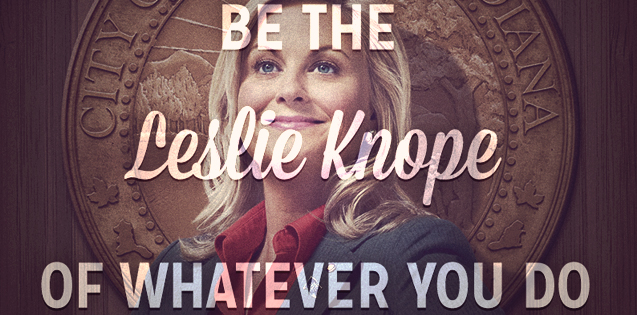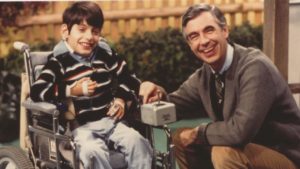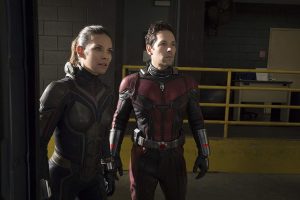We’ve all been there: You put down a book (or wrap up another episode of that show you’ve been binging), and you sit back and think, I wish they were real.
It happens to me — a lot. (And no, it’s not just the Mr. Darcy characters I try to imagine into reality.) I’ve encountered so many wonderful women in fictional worlds, women who — in their flaws and triumphs and quirks — model determination, passion and a zeal for life. They’re women I wish I could befriend. I’ve listed just four of them here. And be warned: There are spoilers ahead.
Leslie Knope, Parks and Recreation
Can one make a list of inspirational female characters — especially right before Election Day — without including Leslie Knope? Absolutely not. When I first began watching Parks and Rec, I thought Leslie would turn out to be a female version of The Office’s Michael Scott: bumbling, scatterbrained, somehow managing to get involved in situations that epitomize the word “awkward.” But as the series unfolds, Leslie proves herself to be a different sort of character, rising above obstacles and awkward in sometimes-delightful, sometimes-delirious, always-Leslie ways.
Leslie is loyal. She’s optimistic. She’s hilarious. She’s fiercely, passionately devoted to her work as a public servant (sometimes to a fault). And in all of those things, she reminds me of some words from our friend Paul: “Do nothing from selfish ambition or conceit, but in humility count others more significant than yourselves.” In an early episode, Leslie’s boss, the gruff Ron Swanson, gives her some insight as to why she’s not crazy about her current boyfriend: “Basically, he’s selfish. And you’re not. That’s why you don’t like him.”
Leslie’s kind of attitude? It’s worth emulating. As the t-shirts and coffee mugs proclaim, “Be the Leslie Knope of whatever you do.”
Kathleen Kelly, You’ve Got Mail
If I’d written You’ve Got Mail, the little bookstore Kathleen Kelly owns would not have been forced to close, and she would have continued selling books to the neighborhood kids for years to come. But this wonderfully ‘ 90s movie (the turtlenecks! the dial-up! the chunky laptops!) doesn’t end my way — the chain bookstore wins, and Kathleen ends up in love with the owner. Still tidy, but with a twinge of sad.
With all the twists and turns life lobs at her, Kathleen challenges and inspires me. I want her curiosity, her thoughtfulness and her ability to articulate it all with a few taps on her keyboard. In a message to her online pen pal (who of course turns out to be Tom Hanks), Kathleen questions her “valuable, but small” life: “So much of what I see reminds me of something I read in a book, when shouldn’t it be the other way around?” In another message, she says, “People are always telling you that change is a good thing. But all they’re really saying is that something you didn’t want to happen at all … has happened.”
And everyone said, “Amen.” The technology in You’ve Got Mail may be dated, but Kathleen’s spark and spirit are certainly not.
Mary Richards, The Mary Tyler Moore Show
I grew up on TV shows from the ‘60s and ‘70s, including one sitcom that redefined the concept of a woman on the silver screen: The Mary Tyler Moore Show. From when it first aired in 1970, Moore “presented a character different from other single TV women of the time. She was not widowed or divorced or seeking a man to support her.” We may see more independent women on TV today, but “this now-common concept was rarely depicted on television in the early 1970s.” As a New York Times editorial puts it, “Mary was television’s first single working woman of significance who didn’t have a standard explanation for her status.”
Watching Mary as a young girl, I knew a bit of the history behind her show. Watching it today, however, I see both American history and my own history in it. All the characters may be wearing bright colors and using typewriters at work, but Mary’s Minneapolis of the early ‘70s somehow feels like my Chicagoland of the 2010s. It’s a big, cold, new place, and Mary arrives there by herself, wondering (in the words of the theme song), “How will you make it on your own?”
With seven seasons, it’s safe to say she makes it — with the help of quirky coworkers, an upstairs-neighbor-turned-best-friend and a good dose of spunk.
Judy, Zootopia
Yep, I’m including an animated character. Because Zootopia is just that good (it received nearly universal acclaim from critics), and its protagonist, Judy Hopps, is that empowering.
At the start of the tale, Judy leaves the family farm and heads for the booming metropolis of Zootopia — a place where “anyone can be anything” — to be the first rabbit to make it onto their police force. Sure, Judy may be an animated animal, but the struggles she encounters from day one feel remarkably human and remarkably familiar: the patronizing comments at work, the attempt to put on a happy face as she calls her parents, the realization that her reality is nothing like the dream she thought it would be.
But does that stop her? Absolutely not. She perseveres through parking ticket duty, seeks out a partner in the most unlikely of teammates, and asks for forgiveness when she blunders. She learns that “life’s a little bit more complicated than a slogan on a bumper sticker. Real life is messy.” But that messiness doesn’t stop her from trying to help fix the broken pieces of her world.
I’ll let Ginnifer Goodwin, who voices Judy, sum it all up: “If I had little girls, I would kill for Judy Hopps to be their role model. And I would kill for Judy to be my boys’ role model, too.”
This is, by no means, a definitive list: I could keep naming female (and male) characters who inspire me until this post becomes more of a book than a blog. So let’s keep it going. Who inspires you? Whose existence are you thankful for (or have been shaped by) — even if their existence happens to be fictional?











